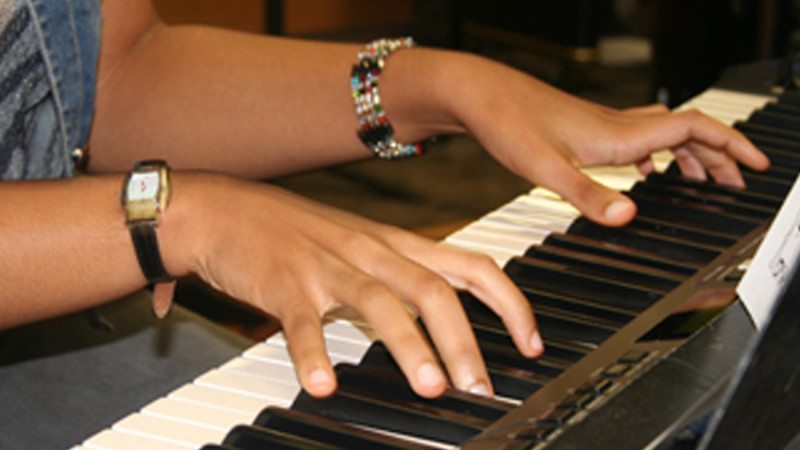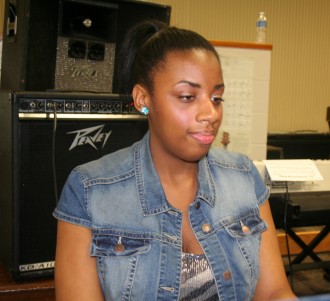Play With Emotion: Student Transforms from Musician to Performer at Polk State

Casey Howard doesn’t know where she’d be today if it weren’t for a keyboard her family bought when she was just a toddler.
She’d had just been diagnosed with what would later be identified as Asperger’s syndrome, a developmental disorder that affects socialization and communication, offering her family an explanation for why she wasn’t progressing like other children her age.
Then her parents brought home that keyboard, intended for their older children’s music lessons, and Howard was immediately drawn to its keys. She began banging out notes, then melodies, displaying before kindergarten the kind of technical talent some spend a lifetime developing.
Music emerged as her outlet, her way of making sense of the world.
But there was still something missing, a crucial element of music that Asperger’s denied her: Emotion.
She found it at Polk State College.
Music Was the Key
Howard’s diagnosis was understandably troubling for her family.
According to the Mayo Clinic, those with Asperger’s syndrome have difficulty interacting with others. Symptoms include a lack of normal eye contact, a lack of facial expression, speaking in a monotone voice, and a difficulty empathizing and being sensitive to others’ feelings. There is no clear cause for Asperger’s and no cure, however therapies can help alleviate the symptoms.
Casey demonstrated all those characteristics of Asperger’s, leading her parents to wonder how she would fare in school, and if she’d one day be able to get a job and support herself.
The answers to those questions were still years away — in fact, there are still many questions about Casey’s future — but the Howards recognized early that music somehow connected with Casey’s brain in a special way.
By age 5, the bars and dots of sheet music were still a foreign language to Casey, but she could play anything she heard by ear. Her older sister, Kaimi, recalls her family listening, stunned, as a tiny Casey played Johannes Brahms’ “Hungarian Dances,” a piece she’d heard as part of a Looney Tunes rendition of the “Three Little Pigs.”
Her mother, Chiquita Butler-Howard, seized music’s power to communicate with Casey. She began singing commands — “Casey, go get mommy’s purse,” she says in a lilting voice for an example. She used beats and chords to teach the multiplication tables and drill Casey for tests.
It all worked. Casey learned, her technical talent grew, and two years ago she enrolled in Polk State’s Music Department.
The Ah-Ha Moment
There is a difference between hands playing music, and the heart feeling it, explains Polk State Music Director John Anderson.
It’s the difference between music students and professional musicians. The difference between a forgettable song and a smash hit.
Connecting with music on an emotional level, and conveying that emotion to others isn’t an easy thing to do, period, Anderson said. But for someone with Asperger’s, who struggles with relating to others on a daily basis, it’s even more difficult.
“Watching her, she was technically flawless. But she had to learn to express emotion. It’s the people who can make music tell a story who are famous,” Anderson said.
Polk State Adjunct Professor Virginia Zechiel worked closely with Casey for several semesters, challenging her with especially emotional pieces of music. She encouraged Casey to conjure mental images that matched the tone of the pieces — maybe the color red for an angry tune, for instance.
But Casey took the technique to another level, developing stories based on the music — with her as the lead character — that would help unlock her emotions.
An “ah-ha” moment came last academic year, Casey said, when she played Chopin’s “Revolutionary.”
“It’s an angry piece. I envisioned guns firing, like in World War II. I pictured people taking babies away from their mothers,” she said. “I was playing in an angry mode.”
The technique has worked time and again, and the difference it’s made in Casey’s playing was put on public display last spring, during a recital arranged just for her as preparation for university auditions.
“She has matured in every way, mentally, emotionally, musically,” Zechiel said.
This semester, Casey is building on the growth she’s known at Polk State as a performer in the College’s Jazz Combo, an ensemble led by Band Director Chris Sharp that improvises much of its performances.
Watching Casey acquire emotional skills at Polk has meant watching her daughter transform from a talented musician into a true performer, Chiquita explained.
“She’s grown so much and the progression she’s made is such a blessing,” she said.
Casey plans on continuing her education after she graduates from Polk State, studying music at a university and continuing to play in her band, Ladyz and the Boyz, throughout Polk County.
Anderson said he’s sure there’s a very bright future waiting for her.
“She’s become a very confident young woman. She’s really matured as a musician. We’re all so thrilled for her…we can’t stand it,” Anderson said.
In addition to Polk State Music, Polk State Fine Arts includes the College’s Theatre and Visual Arts departments, all of which enjoy outstanding statewide reputations.


